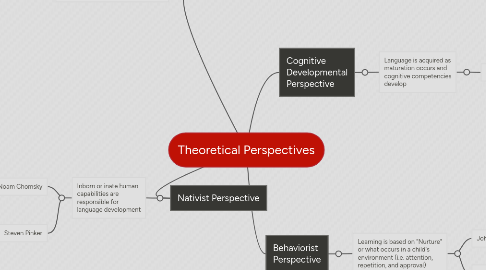
1. Interactionist Perspective
1.1. Language development is influenced by the society in which the individual lives
1.1.1. Lev Vygotsky
1.1.1.1. Zone of Proximal Development: The area between what a child knows and what they have yet to learn
1.1.1.2. Scaffolding or support during the learning process tailored to individual students
2. Nativist Perspective
2.1. Inborn or inate human capabilities are responsible for language development
2.1.1. Noam Chomsky
2.1.1.1. All people have the ability to acquire language
2.1.1.2. Universal grammar: The elements and properties of all human languages
2.1.1.2.1. Language Acquisition Device (LAD)
2.1.2. Steven Pinker
2.1.2.1. Language is an instinct
3. Cognitive Developmental Perspective
3.1. Language is acquired as maturation occurs and cognitive competencies develop
3.1.1. Jean Piaget
3.1.1.1. Stages of Cognative Development
3.1.1.1.1. Stage 1: Sensorimotor (0-2 yrs): Understanding comes through sensory experiences
3.1.1.1.2. Stage 2: Preoperational (2-7 yrs): Symbols can represent objects
3.1.1.1.3. Stage 3: Concrete Operational (7-11 yrs): Can see things from a different point of view
3.1.1.1.4. Stage 4: Formal Operational (11 and up): Can think in abstract ways and use systematic logic
4. Behaviorist Perspective
4.1. Learning is based on "Nurture" or what occurs in a child's environment (i.e. attention, repetition, and approval)
4.1.1. John Locke
4.1.1.1. A child is born a blank slate or "tabula rusa"
4.1.2. B.F. Skinner
4.1.2.1. All behavior is a result of punishment and reward
